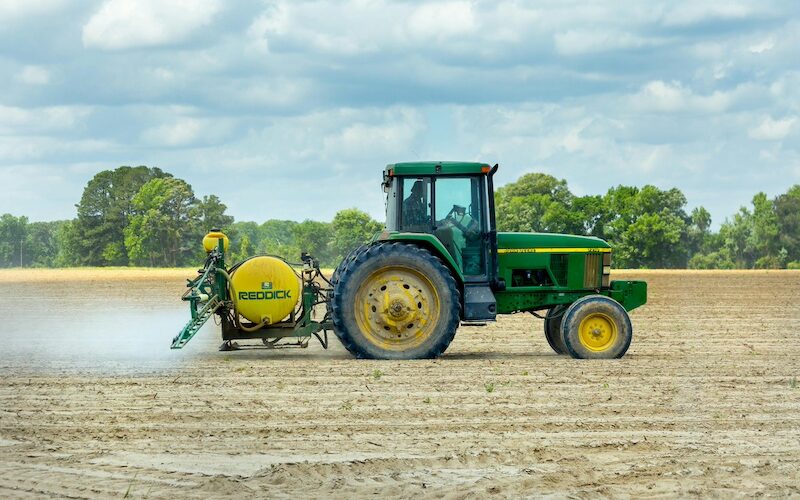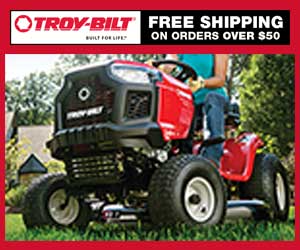
by Kristin Pitzer for Quarter Horse News
A dream many equestrians have is to one day own their own horse property, and for those with only a few horses, buying 20 acres or less can make that dream obtainable. But no matter how small your horse property is, it’s probably going to require more than just a push mower to keep it maintained and functional. If you’re building from scratch, moving heavy equipment around, or even just maintaining large pastures, you’ll likely want to consider buying a tractor to get your tasks accomplished.
Purchasing farm equipment can get complicated quickly, especially if you don’t have any experience with it. It’s not as easy as just walking into a store and selecting any model — you’ll need to do some research on your wants and needs before you ever set foot in a dealership.
Quarter Horse News spoke with Mark Davey, marketing manager at John Deere, and Ty McMaster, Salesman at McMaster New Holland, to get some tips on what to consider when purchasing a tractor for small acreage.
Assess What Work Needs to Be Done
The first thing to think about is what jobs you will need to do on your property. If you already have all the buildings and fencing you want in place, you might just need a small tractor capable of mowing and moving heavy things around. When starting with raw land, though, where you’ll be building fences, ripping out brush or grading roads, you’ll need something that is heavier duty with more horsepower.
“I always ask, are you feeding round bales?” McMaster said. “If you are, you’ll need something that will lift a round bale. Our general rule of thumb is 50 horsepower to lift a round bale safely. Anything less than that, you’re going to be looking at premature wear on your front end.”
Think about the implements you’ll need and how heavy they are. Heavier attachments will require more power to operate and move.
“One top implement that many customers want is a loader, but many also go one step further to get third function hydraulics on the tractor/loader, which allows you to use a grapple to move brush or fence posts more effectively,” Davey said. “Maintaining a gravel road somewhere on the property is quite common. Usually, a box blade or a land plane is a very popular option to grade and spread gravel to keep these roads in top condition.”
Calculate How Much Horsepower You’ll Need
The jobs you’re planning to do will make a difference on the amount of horsepower you need. The more horsepower a tractor has, the heavier the implements it can manage, and the faster it can accomplish tasks like mowing.
“The horsepower usually gets into how much work do you need to get done, and how quickly,” Davey said. “A bigger horsepower tractor will pull a wider rotary cutter to mow that pasture faster, for instance. If you have to tow something with more weight, it requires more engine horsepower. Each rotary cutter has a Power Take Off (PTO) horsepower range that you need in order to properly operate that cutter to mow the pasture.”
This is where the question of whether you plan to feed round bales comes into play. Even some arena drags are heavy enough that they might need a minimum of 60 horsepower to pull them.
“If you are using a common arena drag, a 30 or 35 horse[power] tractor can do that no problem,” McMaster said. “If you’re mowing around your property, you can use a 30 to 40 horse tractor, and you will be looking at a 6-foot mower maxing out, which is fine for a small property. You can get into some tight spots, through gates, no problem. It’s not going to be too cumbersome, and it’s not very expensive either.”
Decide Where to Invest: Time or Money
Once you have an idea of what you’ll need for your property, you’ll need to start saving for your tractor. A good rule of thumb, McMaster said, is to plan to spend about $1,000 per horsepower.
“One thing that I ask people is, what do you want to spend more of? Do you want to spend more time or more money?” McMaster said. “If you don’t like mowing and want to be done as quickly as possible, we need to get you the widest deck we can. That way you’re cutting down on your time. But if you enjoy mowing and that’s your hobby, go with something a little bit narrower. It’s going to leave a better cut.”
“This is where you will need to balance out things like your budget, job efficiency and gate access on the property,” Davey agreed. “Tractor size is a big factor. Think about how much does the tractor need to weigh in order to safely tow the things you want to pull with the tractor? Where do you plan to store it? How tight of a space do you need to get into in order to clean horse stalls? All these are considerations you will want to balance out.”
Consider a Mower for Simple Property Upkeep
If your property is turnkey — barns are built, fences in place, landscape maintained — you’re not planning to move round bales, and you just need to maintain and enjoy it, you could get by with a zero-turn mower instead of a tractor, McMaster said. This option often works best for properties five acres and under.
“A mower will typically have a tighter turning radius than a tractor, making it easier to maneuver around landscaping and trees on your property,” Davey said. “Storing a mower in your garage or shed is much easier since it has a smaller footprint. A mower will also generally weigh less, offering less compaction than a tractor.”
If you’re starting with raw land, are planning to use some of your acreage to grow hay that you cut yourself, or have other facilities to build, a tractor will likely be more useful.
Consult a Dealer for Long-Term Support
When it comes to picking out a tractor, don’t be afraid to have someone more knowledgeable, like a dealer, help you determine the best machine for your needs. That person may know other things to look out for too, such as the type of tires that work best on an equestrian property.
“The less divots or holes you put in the ground, the less chance horses have to roll an ankle and become injured,” McMaster said. “The best way to keep the least amount of ground impact is your tire selection. Ag tires have a very aggressive tread on them because they’re designed to pull through anything, whereas most compact tractors that are used on more ground-conscious properties have industrial tire treads, which have a lot wider tire lugs, so you’re not going to be creating as much ground disturbance.”
A dealership can be a good place to get support not only when picking out a tractor, but also for maintaining it, Davey added. Dealers can order parts that help with routine maintenance of your equipment, or, if you aren’t interested in working on it yourself, they can assist when your machine needs to be serviced.
“A dealer is an important partner in the purchase of mowers or tractors,” Davey said. “Our John Deere Dealer network, for instance, is sprinkled across the country, offering customers after-sales support to help keep your machine running.”
This article originally appeared on American Quarter Horse News and is published here with permission.
There are more informative and entertaining articles in our section on Health & Education. While you're here be sure to check out our Curated Amazon Store.
































